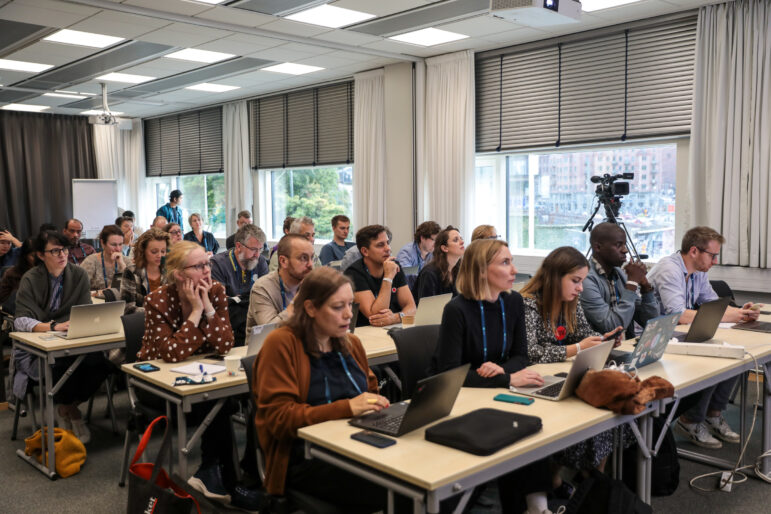

Data Journalism Top 10: The Taliban’s March, Border Walls Quadruple, Kenyan Corruption, White Men Like the Office
Read this article in
Two decades after US-led troops invaded Afghanistan to topple the Islamist regime, the Taliban have retaken control of the country. Our NodeXL mapping from August 9 to 15, which tracks the most popular data journalism stories on Twitter, found an animated map by the Financial Times showing how the Taliban captured various districts across the country before surging into the capital Kabul earlier this week. In this edition, we also feature an investigation into America’s diabetes crisis by Reuters, a Deutsche Welle project on the soaring number of border walls, and a look at the history of data journalism by the Guardian.
Mapping the March Towards Kabul
It took only a few days, rather than the months that many analysts predicted, for the Taliban to seize control of Kabul amid the US withdrawal. The group’s fighters had taken over districts around the country in recent years before rapidly advancing to key cities and finally, entering the capital. The Financial Times used data from the Long War Journal (a project of the Foundation for Defense of Democracies) to create an animated map that illustrates the alarming pace at which the Taliban took control.
Border Barriers
The crisis in Afghanistan has prompted thousands to flee, and while a number of countries have promised to help, Turkey, which already hosts more refugees than any other country in the world, has started reinforcing its borders. The events are unfolding six decades after the start of the construction of the Berlin Wall, a physical and ideological barrier that divided Germany and Europe for 28 years. A team at Deutsche Welle collected and analyzed data to find that the global number of “completed, started, or announced border walls” more than quintupled between 2000 and 2021.
Corruption in Kenya
In Kenya, people are well aware that legal loopholes enable endemic fraud and embezzlement, but the perpetrators of these crimes are rarely revealed or brought to justice. Documentary group Africa Uncensored acquired 25,727 public procurement records and set out to investigate so-called “budgeted corruption” practices.
How Vaccines Make a Difference
As the Delta variant drives a fourth pandemic wave around the world, health experts stress that vaccinations are key to reducing hospitalization, death, and the spread of the virus. To show how immunizations can make a difference, The New York Times simulated a scenario with two COVID-19 outbreaks in communities with low and high vaccination rates.
Google Trends in Germany
Search engines offer insights into public opinion. With Germany preparing for a federal election in September, data analyst Moritz Stefaner explored Google search data — with the help of Google Trends — to find out what topics Germans are most interested in related to the election. Stefaner compared the search interest in the six most popular parties and looked at how their popularity has changed since the last election.
America’s Diabetes Crisis
As healthcare systems across the United States struggled to deal with the impact of the coronavirus last year, the pandemic exposed another public health crisis — the nation’s fight against diabetes. Millions of Americans suffer from diabetes, and COVID-19 has had an especially devastating impact on their life and health. Reuters analyzed data from the US Centers for Disease Control and Prevention and other sources to show how the pandemic has increased the risks for diabetics and worsened their health outcomes.
White Men Like the Office
Are you still doing your job remotely? Do you miss full-time, in-person work, or are you among those who say not at all? For many people, working from home — at least some of the time — is a preferable option, even if their company offers a safe physical environment. FiveThirtyEight analyzed the results of a survey on this topic, with over 10,000 respondents from the US, Australia, France, Germany, Japan, and the UK. Guess who’s most enthusiastic about returning to work? White men, by nearly twice the number as Black men.
Lionel Messi’s Legacy
After 21 years with Barcelona, Lionel Messi, one of the greatest players in soccer history, has left the Spanish powerhouse to join Paris Saint-Germain in France. During 17 seasons at Barcelona, Messi won 35 domestic and European trophies and scored a staggering 672 goals in 778 appearances. The Economist examined the numbers behind the Argentine forward’s legendary career and devised a formula to compare him to other great soccer goal scorers.
An Alternative Olympic Ranking
The Olympics are over and the US team came on top of the overall table with 39 golds and 113 medals in total. The most successful European nation was Great Britain with 22 golds. But what if instead of ranking countries, the table was based on the success of specific regions? Italian think-tank OBS Transeuropa and the European Data Journalism Network published an unorthodox analysis of Europe’s performance at the Tokyo Olympics in which the regions of Ile-de-France (France) and Belgrade (Serbia) come out on top; when a region’s population is taken into account, Budapest also does well.
The Evolution of Data Journalism
Data journalism has become an ambitious and powerful instrument for storytelling in the digital age. But this reporting technique has a long history and its roots can be traced to the early 19th century. The Guardian dug deep into the archives to find historical examples of data-driven coverage and track the evolution of this field.
Thanks again to Marc Smith and Harald Meier of Connected Action for gathering the links and graphing them. The Top Ten #ddj list is curated weekly.
 Peter Georgiev is GIJN’s social media and engagement editor. Previously, he was part of NBC News’ investigative unit in New York. He also worked as a correspondent for Bulgarian National Television and his reporting has been published by the Guardian, Deutsche Welle, and other international outlets.
Peter Georgiev is GIJN’s social media and engagement editor. Previously, he was part of NBC News’ investigative unit in New York. He also worked as a correspondent for Bulgarian National Television and his reporting has been published by the Guardian, Deutsche Welle, and other international outlets.










